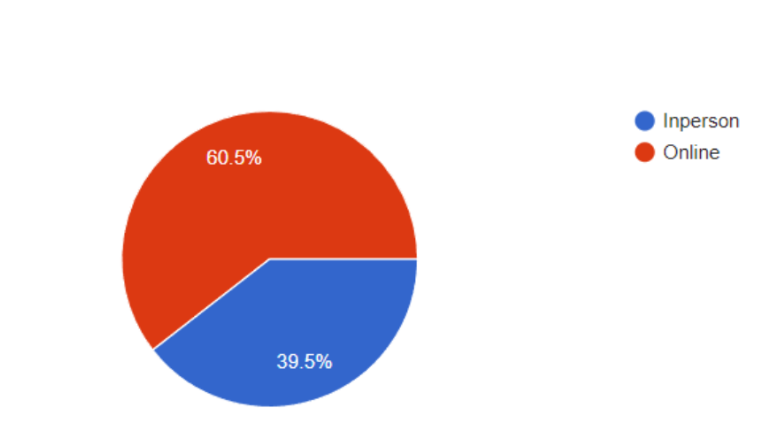Students Respond to the Return of In-person Exams

By Brianna Elliott
ANU has returned to all examinations being held in person. The recent shift to exclusively in-person exams has ignited discussions among ANU students, sparking debates among students about which exam format is more beneficial or detrimental during highly stressful exam periods.
An ANU spokesperson confirmed that the decision to return to in-person exams was enacted “from 1 July 2023”, and any “classes that were offered online in response to the COVID-19 pandemic have fully transitioned back to face-to-face study”.
This also encompasses any assessments and examinations that were previously available to be completed via online forms, which will follow the transition to being in-person.
This has stemmed from Australian universities nationally, including ANU, being concerned about ChatGPT amongst other artificial intelligence software increasingly being used to write student’s essays and exam answers. As a means to combat this, there has been a nation-wide decision to reduce online exam formats and replace them with in-person examinations.
The Group of Eight (Go8) deputy chief executive, Dr Matthew Brown discusses the way AI programs will be tackled in universities will include more “supervised exams”, “greater use of pen and paper exams” and “tests only for units with low integrity risks”.
An ANU spokesperson further agrees with Dr Brown’s assessment redesign, stating, “this return to in-person study aligns with the government’s direction to Australian universities”.
However, in response to ANU’s restriction of online exams, ANUSA Disabilities Co-Officer Maddi McCarthy has highlighted a campaign that is trying to increase the inclusivity for students at ANU, by giving students the availability to sit both online and in-person exams.
The goals of this campaign comprise “accessibility”, “transparency”, “accountability” and “awareness”, which according to McCarthy, highlight the need for a “safer and more accessible [campus] for disabled students”.
McCarthy also criticised how in-person-only exams are “inaccessible and, at worst, dangerous” particularly because they can cause “sensory overload” for many students with “mental health conditions or neurodivergence”.
With a significant portion of ANU students and staff immunocompromised, there is an increased fear and risk involved when “exposing themselves to a confined environment with a high concentration of other students”. Therefore, McCarthy’s campaign emphasises the importance of “having the flexibility of running both online and in-person options” as it “allows more students equal access to tertiary education, which no student should have to sacrifice their safety for”.
In a survey conducted by Observer we asked students what their preferential exam format was, resulting in a near-even split of opinions. The responses revealed that 60.5 percent of students prefer online exams whilst 39.5 percent preferred the traditional format of in-person exams.

Above: exam preference survey results.
Both groups had respondents from a range of different year groups, contradicting Andrew Norton, ANU’s higher education expert, who believed there was resistance from students that had only experienced online university since Covid-19. Despite this, the survey responses suggest there is no distinct group that favours online examinations.
Reportedly, only 50 percent of students that responded to the survey have ever sat an in-person exam at ANU. Many of the students who had taken an exam in-person highlighted their courses were better suited to face-to-face structures as the online exams “are often impossible to finish”.
Additionally, the respondents who preferred in-person examinations emphasised they had “fewer technical issues” which makes it “easier to focus”, “fairer” and therefore “less cheating” occurs.
In contrast, students who have never had to sit an in-person exam before shared concerns regarding their grades and exam performance. Students explained that they favour online exams because they are “less stressful”, “more flexible”, and “can be done in the comfort of [their] own home” which allows them to feel “more prepared”.
Students have also highlighted that “[in-person exams] don’t offer a more accurate measure of intelligence” instead “the ability to form a well-written answer is more important than being able to recall information.”
Despite the arguments for online examinations, there have recently been some posts on ANU Confessions – a popular Facebook page amongst ANU students – commenting on why in-person examinations are better for students. Some respective advantages that were brought up include “asking a question is as simple as raising your hand”, “[in-person exams] are well run and error-free”, “environment is more conducive… with a greater sense of camaraderie” and they “disincentive cheating”.
A solution provided in Observer’s survey by a respondent for this debate was “open-book in-person exams” which could achieve a balance between online and in-person examinations. This would accommodate the university’s need to prevent AI usage while simultaneously not relying on “memorisation of content, facts and statistics”.
ANU and ANUSA will release more information regarding examinations and managing stress and time prior to the upcoming examination periods.
Students interested in signing the petition McCarthy is campaigning for can find it here, or email [email protected] for more information.
Graphics by Will Novak
Know something we don’t know? Email [email protected] or use our anonymous tip submission.
If you have an issue with this article, or a correction to make, you can contact us at [email protected], submit a formal dispute, or angry react the Facebook post.
Want to get involved? You can write articles, photograph, livestream or do web support. We’re also looking for someone to yell “extra!” outside Davey Lodge at 1AM. Apply today!









